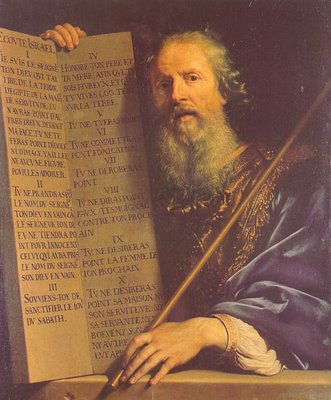
Ooh, the theological implications of this stunt.
WIN MY SOUL
With what I have seen on the web, I would bet Satan surfs the internet. If Esau sold his birthrite so easily ... (when he really didn't mean it, right?), this guy better be careful.
RS
You never know what you'll find in a sacristy.





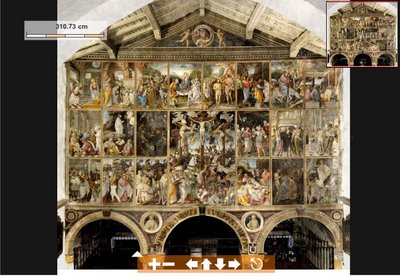
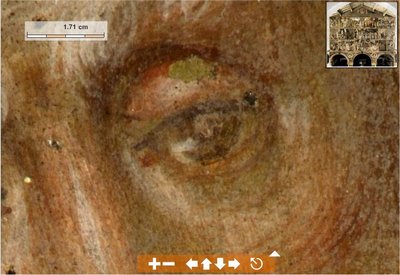
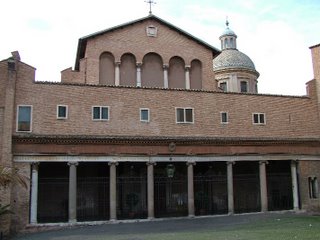
 So, today is the feast of Saint Saturninus of Carthage (not to be confused with Saint Saturninus of Toulouse, a bishop and martyr in France, whose feast is also today). Not much is known about Saint Saturninus of Carthage, except what the Roman Martyrologies say (I use the plural since there is the "old" Roman Martyrology, a new Roman Martyrology was published in 2002, and then revised in 2004).
So, today is the feast of Saint Saturninus of Carthage (not to be confused with Saint Saturninus of Toulouse, a bishop and martyr in France, whose feast is also today). Not much is known about Saint Saturninus of Carthage, except what the Roman Martyrologies say (I use the plural since there is the "old" Roman Martyrology, a new Roman Martyrology was published in 2002, and then revised in 2004).Romæ, via Salaria, natális sanctórum Mártyrum Saturnini senis, et Sisinii Diáconi, sub Maximiáno Príncipe; quos, diu in cárcere maceratos, jussit Urbis Præfectus in equuleum levári et attrahi nervis, fustibus ac scorpiónibus cædi, deínde eis flammas apponi, et, depositos de equuleo, cápite truncari.
At Rome, on the Salarian Way, the birthday of the holy martyr, Saturninus, an aged man, and the deacon Sisinius, in the time of Emperor Maximian. After a long imprisonment, by order of the prefect of the city they were placed on the rack, stretched with ropes, scourged with rods and whips garnished with metal, then exposed to the flames, taken down from the rack and beheaded.- from breviary.net's Roman Maryrology pages
Romæ in cœmetério Trasónis via Salária Nova, sancti Saturníni Carthaginénsis, mártyris, qui, ut sanctus Dámasus papa refert, sub Décio imperatóre pro Christo in pátria in ecúleo impósitus est et Romam extórris missus, ubi, áliis atrócibus torméntis superátis, Gratiánum tyránnum ad fidem convértit et cápite obtruncáto corónam martýrii adéptus est.(My rough translation)
At Rome, in the cemetary of Trasonis on the New Via Salaria, Saint Saturninus of Carthage, martyr, who, Pope Saint Damasus relates, that under the Emperor Decius, in his homeland he [St. Saturninus] was placed on the rack for Christ, and sent into exile in Rome, where, having overcome other severe tortures, converted the tyrant Gratianus to the faith, and [St. Saturninus] being beheaded obtained the crown of martyrdom.I'm not sure what happened to St. Saturninus' deacon companion Sisinius in the new Martyrology. I often worry that some parts of legends are automatically thrown out if they can't be proven, rather than keeping them until the can be proven false. That is often the case in the rather snotty comments in the Thurston & Atwater edition of Butler's Lives of the Saints.
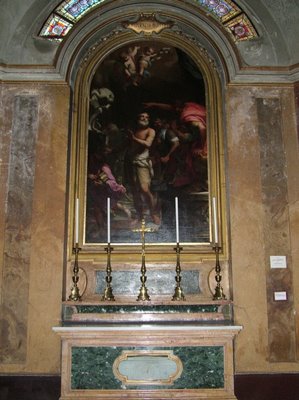 The sarcophagus in the altar used to have most of his relics, but the sacristan at the Basilica told me that a new parish was erected in Rome under his patronage and some of the remains were given to that parish.
The sarcophagus in the altar used to have most of his relics, but the sacristan at the Basilica told me that a new parish was erected in Rome under his patronage and some of the remains were given to that parish. This Basilica has many great paintings and the remains of several saints:
This Basilica has many great paintings and the remains of several saints: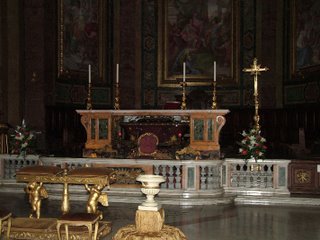
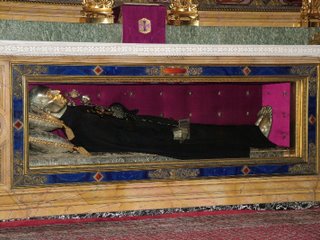

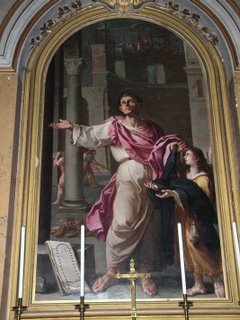

 which is catecorner from the Circus Maximus:
which is catecorner from the Circus Maximus: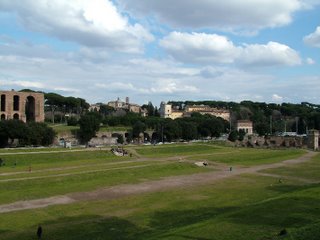

 (Click the picture for a much better view. Great resolution of K2.)
(Click the picture for a much better view. Great resolution of K2.)
Most Sweet Jesus, Redeemer of the human race, look down upon us humbly prostrate before You. We are Yours, and Yours we wish to be; but to be more surely united with You, behold each one of us freely consecrates himself today to Your Most Sacred Heart. Many indeed have never known You; many, too, despising Your precepts, have rejected You. Have mercy on them all, most merciful Jesus, and draw them to Your Sacred Heart.The “Technical” Stuff
Be King, O Lord, not only of the faithful who have never forsaken You, but also of the prodigal children who have abandoned You; grant that they may quickly return to their Father’s house, lest they die of wretchedness and hunger.
Be King of those who are deceived by erroneous opinions, or whom discord keeps aloof, and call them back to the harbor of Truth and the unity of Faith, so that soon there may be but one flock and one Shepherd.
Grant, O Lord, to Your Church assurance of freedom and immunity from harm; give tranquility of order to all nations; make the earth resound from pole to pole with one cry: Praise to the Divine Heart that wrought our salvation; to It be glory and honor forever. Amen.


 "We don't have a lot of time on this earth, we weren't meant to spend it this way. Human beings were not meant to sit in little cubicles staring at computer screens all day, filling out useless forms and listening to eight different bosses drone on about mission statements."
"We don't have a lot of time on this earth, we weren't meant to spend it this way. Human beings were not meant to sit in little cubicles staring at computer screens all day, filling out useless forms and listening to eight different bosses drone on about mission statements."
| What American accent do you have? Your Result: The Midland "You have a Midland accent" is just another way of saying "you don't have an accent." You probably are from the Midland (Pennsylvania, southern Ohio, southern Indiana, southern Illinois, and Missouri) but then for all we know you could be from Florida or Charleston or one of those big southern cities like Atlanta or Dallas. You have a good voice for TV and radio. | |
| The West | |
| The Inland North | |
| The South | |
| The Northeast | |
| Philadelphia | |
| Boston | |
| North Central | |
| What American accent do you have? | |



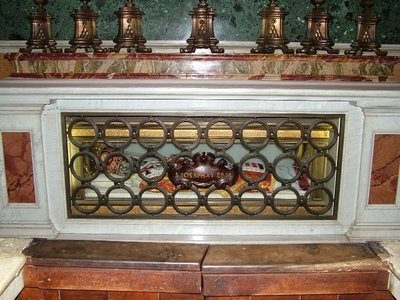
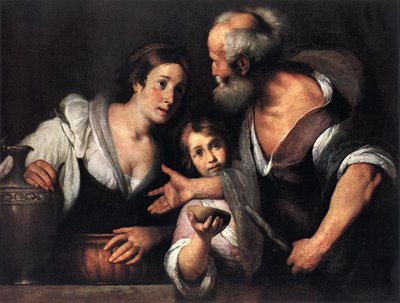
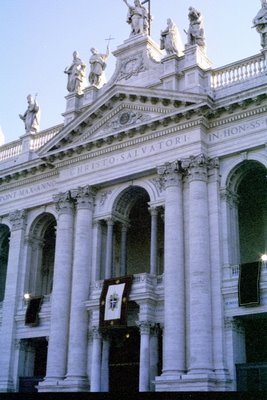
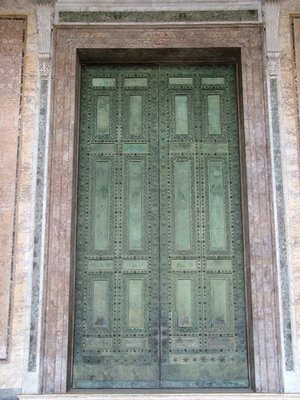
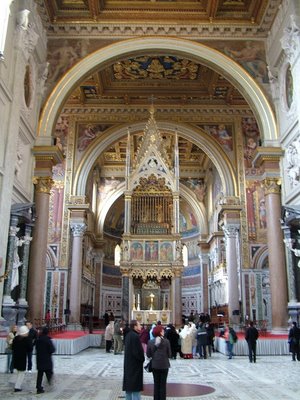


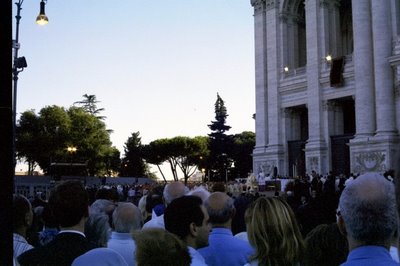
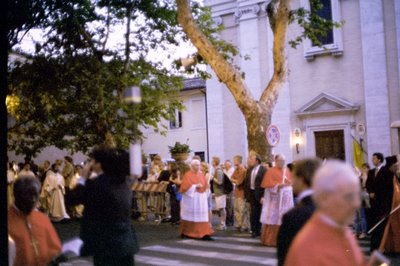
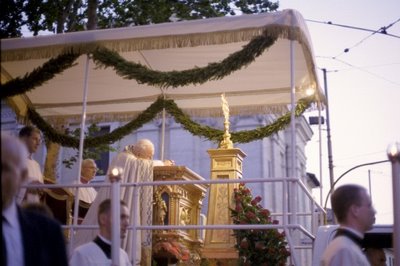

Likewise, legal expressions such as "which shall have the force of law in perpetuity, We order and enjoin under pain of Our displeasure that nothing be added to Our newly published Missal, nothing omitted therefrom, and nothing whatsoever altered therein" cannot be literally interpreted as binding on possible later actions of Pope St. Pius V or upon his successors. The strictures fall only upon those who act without due authority.Read the full article over at Zenit.
If it were otherwise, then Pope St. Pius V would have excommunicated himself a couple of years after publishing "Quo Primum" when he added the feast of Our Lady of the Rosary to the missal following the Battle of Lepanto in 1571, not to mention Pope Clement XI who canonized Pius V in 1712, thus altering the missal.
